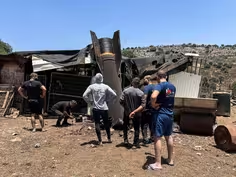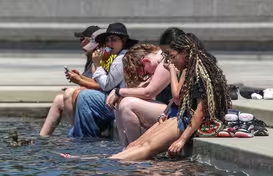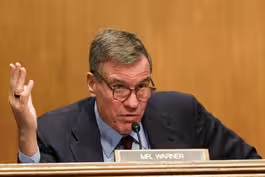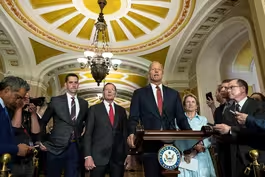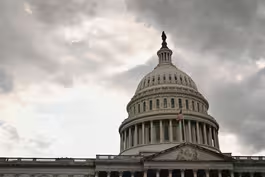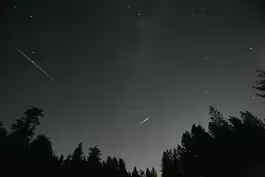
What's next for Iran's regime? Analysts weigh in
Clip: 6/24/2025 | 7m 30sVideo has Closed Captions
What's next for Iran's regime after U.S. strikes and Israel ceasefire? Analysts weigh in
For two perspectives on Israel's conflict with Iran and U.S. involvement, Geoff Bennett spoke with Aaron David Miller and Holly Dagres. Miller is a senior fellow at the Carnegie Endowment for International Peace and a former State Department official. Dagres is a senior fellow at The Washington Institute for Near East Policy and curates "The Iranist," a weekly newsletter on Iran.
Problems playing video? | Closed Captioning Feedback
Problems playing video? | Closed Captioning Feedback
Major corporate funding for the PBS News Hour is provided by BDO, BNSF, Consumer Cellular, American Cruise Lines, and Raymond James. Funding for the PBS NewsHour Weekend is provided by...

What's next for Iran's regime? Analysts weigh in
Clip: 6/24/2025 | 7m 30sVideo has Closed Captions
For two perspectives on Israel's conflict with Iran and U.S. involvement, Geoff Bennett spoke with Aaron David Miller and Holly Dagres. Miller is a senior fellow at the Carnegie Endowment for International Peace and a former State Department official. Dagres is a senior fellow at The Washington Institute for Near East Policy and curates "The Iranist," a weekly newsletter on Iran.
Problems playing video? | Closed Captioning Feedback
How to Watch PBS News Hour
PBS News Hour is available to stream on pbs.org and the free PBS App, available on iPhone, Apple TV, Android TV, Android smartphones, Amazon Fire TV, Amazon Fire Tablet, Roku, Samsung Smart TV, and Vizio.
Providing Support for PBS.org
Learn Moreabout PBS online sponsorshipGEOFF BENNETT: Now to two additional perspectives on the conflict with Iran.
Aaron David Miller is a senior fellow at the Carnegie Endowment for International Peace and a longtime State Department official in both Democratic and Republican administrations.
And Holly Dagres is a senior fellow at The Washington Institute for Near East Policy.
She spent her teenage years in Tehran and curates The Iranist.
That is a weekly newsletter.
Our thanks to you both for being here.
Aaron David Miller, I will start with you and your initial reactions to this U.S. intelligence assessment, this early assessment, that believes the strikes on Iran's nuclear program send it back only a few months at best.
AARON DAVID MILLER, Carnegie Endowment for International Peace: You know, as a former member of the intelligence community, I take clear, accurate, and unbiased and non-politicized intelligence seriously.
DIA's estimates have always been pretty conservative, and it's early days yet, as the Brits would say.
This is one assessment.
And, frankly, since I don't believe in Hollywood endings in this region, game changers, inflection points, transformations, I think we have to be very, very, very sober and clear-eyed about the road that lies ahead, A, in terms of what damage we have actually done that would, in the administration's or the president's words -- quote -- "totally obliterate" - - unquote -- Iran's nuclear program.
I don't think that's what's occurred.
And, second, how you convert a tenuous cease-fire into a full cessation of hostilities, and then a political agreement, which seems to me the only way to actually -- unless we're talking about changing the regime, the only way to guarantee, if there is such a guarantee, that Iran won't have a nuclear weapon.
GEOFF BENNETT: And, Holly Dagres, where does this leave the Iranian regime?
Does it emerge stronger just by surviving, having survived these strikes?
HOLLY DAGRES, Senior Fellow, The Washington Institute for Near East Policy: Well, that's an important question that we're trying to answer right now, because we're not exactly sure what are the dynamics between -- within the clerical establishment.
I think one journalist from Tehran noted, we don't know where the supreme leader is.
He's been hiding in a bunker.
For all we know, he might not be around anymore because of all these rumored conversations about maybe replacing him.
So I think that it's key, though, that publicly, at least according to open-source intelligence, we haven't seen those key vulnerabilities with -- domestically.
We haven't seen public defections.
We haven't seen mass protests.
We haven't seen acute food shortages or whatnot that would suggest that this regime's on the verge of collapse, per se.
But it doesn't mean that these things can't materialize in the near future.
So these are really important indicators to watch.
GEOFF BENNETT: And, Holly, is there any reason to think that the regime would reconsider its nuclear ambitions as a result of these punishing military strikes?
HOLLY DAGRES: The Islamic Republic has spend hundreds of billions of dollars on its nuclear program.
It has had its nuclear scientists assassinated over the years, of course, during those two-week wars as well.
And so to under -- this has been a very much a point of pride for the Islamic Republic.
They have always chanted that in protest when I was growing up there, nuclear energy is our inherent right.
And just to see them actually decided to change that, to actually let go of this program in its entirety, I find it hard to believe, because it would be seen as a humiliation and them bending the need to what it views as two aggressors, Israel and the United States.
GEOFF BENNETT: And, Aaron, what do you see as the path forward for how Israel and the U.S. deal with Iran?
AARON DAVID MILLER: I think it's going to be really fraught.
And I'm not sure there's a ready-made Rx, or prescription, in the road ahead.
Maintaining the cease-fire, I think, is important.
But if in fact that's going to survive, you're going to need to create conditions.
The U.S. is going to have to negotiate both with Iran and with Israel separately to talk about expectations.
What is a violation?
Will there be a monitoring mechanism in order to guarantee or to report in order to preempt or prevent conflict that would flow from such violations?
You have got the pattern in Lebanon, the cease-fire agreement that the Biden administration concluded last November.
You have a monitoring committee.
But, again, it's hard to believe, as the weeks go by, that the Israelis won't find it in their interest to prevent and preempt if they find evidence that Iran is doing any number of things, reviving its ballistic missile production facilities, for example, sending precision-guided munitions to Hezbollah, or if the Israelis discover undeclared sites, or we do, in which Iran has moved or has originally displaced -- placed advanced centrifuges.
So I think the road ahead is fraught and it's going to require a very, very realistic assessment by the administration of what constitutes success.
GEOFF BENNETT: And we have a couple of minutes left.
I want to get both your perspectives on this notion of regime change.
Throughout this conflict, Israeli officials have talked openly about wanting to see regime change in Iran.
The U.S. has said -- now they say it's not on the table.
President Trump has said it's not on the table, after suggesting it might be.
Where does that leave things?
Aaron, we will start with you.
AARON DAVID MILLER: You know, if you look in recent years, there are three models of regime change.
Russia, Egypt and Tunisia, where there were massive protests in the streets.
Security establishments refused or couldn't control the crowds.
And, in the case of Egypt, the military edged Mubarak.
That's one.
Number two is what happened in Syria in December.
You have an organized group, HTS, former affiliate of al-Qaida, surge into Damascus in the face of a hollowed-out regime and the regime collapses.
Or the Bush 43 model, you invade the country and oppose its evil dictator.
I don't see any of these as appropriate, right, or conducive to the Iranian case.
But I defer to Holly on this.
GEOFF BENNETT: Holly, final word.
HOLLY DAGRES: Well, I want to just note that we have had successive uprisings, including most recently the 2022 uprising, known as the Woman, Life, Freedom uprising.
And it was -- the whole goal was positive change, because a majority of Iranians want to see this regime gone.
And, just big picture, if this cease-fire holds, this regime will take a revenge on its people.
It'll take revenge on the dissidents, on the political prisoners.
It will cause - - it will lead to mass executions.
It will go after anybody that they see as not in line with the regime's rhetoric.
And that's very worrisome, especially in this climate of uncertainty.
And so I just want to emphasize that.
GEOFF BENNETT: Holly Dagres, Aaron David Miller, our thanks to you both for sharing your insights this evening.
We appreciate it.
AARON DAVID MILLER: Thank you.
How proposed cuts to Medicaid could affect rural hospitals
Video has Closed Captions
Clip: 6/24/2025 | 4m 3s | How proposed cuts to Medicaid could affect rural hospitals (4m 3s)
Israel-Iran ceasefire holds as Trump lashes out at both
Video has Closed Captions
Clip: 6/24/2025 | 9m 39s | Fragile Israel-Iran ceasefire holds as Trump lashes out at both sides (9m 39s)
News Wrap: 160 million enduring brutal U.S. heatwave
Video has Closed Captions
Clip: 6/24/2025 | 4m 49s | News Wrap: 160 million enduring brutal conditions in U.S. heatwave (4m 49s)
Sen. Warner questions delay of Iran strike briefing
Video has Closed Captions
Clip: 6/24/2025 | 7m 17s | Sen. Warner questions administration's delay of Iran strike briefing (7m 17s)
Time running out for GOP to pass tax plan by Trump deadline
Video has Closed Captions
Clip: 6/24/2025 | 4m 38s | Time running out for GOP to pass massive tax and spending plan by Trump's deadline (4m 38s)
Trump's attempt to claw back funding, explained
Video has Closed Captions
Clip: 6/24/2025 | 7m 23s | Trump's attempt to claw back funding approved by Congress, explained (7m 23s)
White House set to roll back national forest protections
Video has Closed Captions
Clip: 6/24/2025 | 6m 54s | White House set to roll back protections for nearly 60 million acres of national forests (6m 54s)
Providing Support for PBS.org
Learn Moreabout PBS online sponsorshipSupport for PBS provided by:
Major corporate funding for the PBS News Hour is provided by BDO, BNSF, Consumer Cellular, American Cruise Lines, and Raymond James. Funding for the PBS NewsHour Weekend is provided by...

